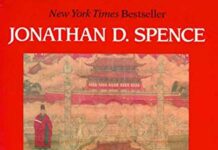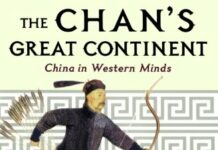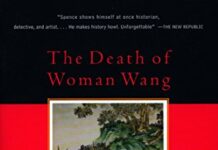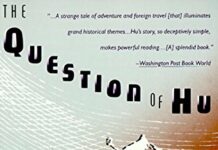
Ebook Info
- Published: 1996
- Number of pages: 432 pages
- Format: PDF
- File Size: 7.22 MB
- Authors: Jonathan D. Spence
Description
“A magnificent tapestry . . . a story that reaches beyond China into our world and time: a story of faith, hope, passion, and a fatal grandiosity.”–Washington Post Book WorldWhether read for its powerful account of the largest uprising in human history, or for its foreshadowing of the terrible convulsions suffered by twentieth-century China, or for the narrative power of a great historian at his best, God’s Chinese Son must be read. At the center of this history of China’s Taiping rebellion (1845-64) stands Hong Xiuquan, a failed student of Confucian doctrine who ascends to heaven in a dream and meets his heavenly family: God, Mary, and his older brother, Jesus. He returns to earth charged to eradicate the “demon-devils,” the alien Manchu rulers of China. His success carries him and his followers to the heavenly capital at Nanjing, where they rule a large part of south China for more than a decade. Their decline and fall, wrought by internal division and the unrelenting military pressures of the Manchus and the Western powers, carry them to a hell on earth. Twenty million Chinese are left dead.
User’s Reviews
Reviews from Amazon users which were colected at the time this book was published on the website:
⭐Hong Xiuquan raised a rebellion in 19C southern China. It was based on his own version of Christianity, according to which he was a Moses-like figure who knew God and was also the younger brother of Jesus. Not only did he find hundreds of thousands of willing converts, but he led an army and established a mini-state in which he reigned as absolute king for a decade. This led directly to the deaths of some 10 million. I have long been fascinated by this bizarre episode, in no small part because it occurred in the generation prior to the birth of my grandparents in nearby Canton. Now, I’ve found a near-perfect book to understand it.Hong started out as a typical aspirant to the imperial bureaucracy, taking the lower-level exams multiple times. After his fourth failure, he had a kind of breakdown, became deathly ill, and entered into a hallucinatory or miraculous state, gaining entry to heaven and communing with God, Jesus, and a variety of others. Upon awakening, his family feared he had gone insane, but he merely took up a lowly teaching position and got on with his life. After nearly a decade, he finds his copy of a crude, early translation of the Bible into Chinese and upon reading it, begins to proselytize.This is where it gets really interesting. Knowing the classical forms and local religious traditions, Hong can express his views in ways that speak directly to the Southern Chinese. He can even deal with local potentates, arguing in legalistic terms and language and in accordance with recent international treaties for freedom to disseminate his views. This works for a time, but he increasingly goes against Confucianism and finally the Qing Emperor himself. At the right moment, he goes into hiding, initiating a military-scale rebellion.Perhaps due to his charisma and their zeal, Hong’s forces rack up a number of victories against the already weakened state, which is reeling from humiliating assaults by foreign forces, the opium war, and escalating brigandage, particularly in the south. Soon, they control a vast swath of territory, settling in Nanjing as their heavenly capitol. Hong creates his own dynasty, often expelling traditional officials and installing his family members or proven faithful. It is similar to the Imperial forms of hierarchy, but buttressed by religious fanaticism.In the meantime, courtiers emerge. Xiao Chaogui begins to speak in trances, as the voice of Jesus, directly to the faithful. He soon falls in military action and is replaced by Yang Xiuqing, who claims to be speaking directly with the voice of God himself. Yang quickly begins to challenge Hong, establishing a network of spies to report dissension and doubts, doling out judgments based on his visions. Hong is coy, but ends up ordering his murder and those of Yang’s 6000 top followers, who congregated to watch the punishments of one of his lieutenants. It is a killing field, perhaps similar to that of Kurtz as portrayed in Apocalypse Now. Hong never refutes Yang’s visions.In an attempt to elaborate his theology, Hong consults a number of European missionaries. It appears that he develops a kind of Arianism, whereby Jesus is not divine but still the son of God. He also edits a version of the Bible, omitting offending passages and formulating his own, different set of 10 commandments. He goes very deep into Christology.Meanwhile, as Hong’s forces are divided, the Qing begin to rally and it quickly becomes a contest of the gifted amateurs against the hardened and experienced professional corps of the Emperor. Slowly but surely, Hong’s forces are whittled away, leading to a catastrophic final confrontation at Nanjing. Hong dies, apparently of natural causes, and his 15-year old son is on the throne for the apocalyptic slaughter.The reader should be aware that this book offers only a minimum of the context that is available in Spence’s other masterwork, In Search of Modern China. I wanted more, but was acquainted with much of the history. Nonetheless, this is not just a history, it is a unique literary event. Though a traditional historian, Spence is also a master stylist. This is one of the most brilliant and fascinating narratives of a historical moment that I have ever read. Recommended with enthusiasm and wonder.
⭐Jonathan Spence remarks in his foreword that much has been written about the 1850 Taiping rebellion in the west, and even more in the east. Despite the rebels dubious theological foundation, China’s communists canonized them as an early socialist movement. The Taiping have remained a topic of interest, with many books recently written. Spence synthesizes Chinese and English research, and also considers two newly discovered texts by the mid-century master of mayhem, Hong Xiuquan.The story begins with British missionaries in China. Disseminating Christianity was second only in importance to importing opium, and war helped secure both. Hong receives a bastardized Bible translation that resembles Buddhist and Confucian tracts in its Commandments and depictions of Hell. Having failed his civil service exams, Hong has visions he is the son of God and brother of Jesus. The Heavenly Father calls him to fight the demonic works of Confucian sacrifice and Taoist idolatry.Hong travels the countryside to convert and baptize, and networks amongst his ethnic group fellows. Pirates, flushed out by the British occupation of Hong Kong, triad gangsters and highway bandits soon join forces. Early victories and Qing failures cement his hold on almost half the empire. At its greatest extent the would be dynasty reached the Yangtze river, and left thirty million dead in its wake. It nearly repealed the Manchu mandate, and foreshadowed their overthrow by a half century.At the most basic level, Hong conflates Confucian family values with Christian doctrine. Where the New Testament allows God to have a son, Hong adds an extended family. God gains a wife, several other sons, daughters-in-law and grandchildren, as dynastic circumstance demands. The unruly clan includes mad uncles who channel the voices of Jesus and God himself, until family feuds and civil war doom everyone to a well deserved communal bloodbath.It is difficult to tell if Hong’s beliefs were intentional fraud, self delusion or a mixture of both. The Heavenly Kingdom had equal elements of religious cult and revolutionary army. Couched in millenarian mumbo jumbo, it’s easy to dismiss the entire project as a lunatic fringe group, if not for the megalomaniac scale it attained. It is understandable how Mao, born shortly later, would have seen this as a period for study. The book situates events clearly within their context.At times this book may reflect a historical bias towards British gunboat diplomacy and missionary zeal. Opium Wars were waged to ‘end the restrictive system and open ports…establish churches and spread the word of God’. In regards to Chinese sovereignty a critique seems missing, although Spence notes the destabilizing effects of foreign pressure on the Qing empire. Western interventions seem rational and judicious, in contrast to Chinese intransigence and superstition.The strength of the work is in its study of the religious mindset of the time. It shows the social and cultural setting that gave rise to a 19th century apocalyptic political movement. Although it isn’t a general history, it does trace the major events along a narrative timeline. Spence tells the tale in the present tense, which adds a sense of immediacy to the proceedings. This is not a dry scholarly undertaking, nor is it pop history fluff. I would consider reading it before a simple military account.
⭐Very few people in the West know anything at all about the Taiping Rebellion which roughly coincided with the American Civil War of the early 1860s. An estimated 20 million+ people died as a result of a misunderstanding about Christianity… Those of us who are interested in it usually approach the Rebellion through reading about mercenaries like Ward and Gordon defending Shanghai and the foreign settlements. This book puts the Taipings into their proper Chinese context and shows that foreign interventions were extremely periferal to the enormous conflict which stretched over 2000 miles from Canton almost to the Imperial capital Peking. Ward, Gordon and their ‘Ever Victorious Army’ are barely more than a footnote to the real fighting in which many Chinese on both sides showed enormous bravery and tenacity in fighting for their beliefs, however strange.There can be no doubt but that Jonathan Spence is the greatest living Western scholar of Chinese history and this is an important book. It is a shame that the publishers have saved themselves a lot of trouble by not using any Chinese characters in the print, not even in the bibliography (I’m no expert, but it would have been useful, particularly with so ‘literary’ a movement as the Taipings). The illustrations are also rather disappointing, a nice selection but badly reproduced. Prof Spence’s writing style can also jar, especially his use of the present tense to describe things that happened in the, er, past – which does have a useful tense of its own. Despite those reservations, fairly readable, and you ask yourself: When exactly does a humble persecuted minority turn into a raging, almost unstoppable torrent of angry humanity?
⭐This is a book full of detail, sometimes overwhelming detail. It tells the story of the rebellion from the side of the rebels drawing on Chinese and western sources. The story moves quickly but the constant use of the present tense in the narrative can become irritating. Some attempt is made to set the events in their social, religious and historical context but one would have appreciated a little more analysis and evaluation and more about the government against which they were rebelling. The emperor is a distant figure barely visible in the narrative. For those unfamiliar with these bizarre events this is a good introduction.
⭐Couldn’t get on with history written in the present tense. Maybe it’s just me….
⭐An excellent read about an overlooked topic – one that cost 20-30 million lives. In a wonderful manner, Spence proceeds to describe the path of the man who would view himself as Jesus’ younger brother and the reformer necessary for China. Part syncretic religion, part political rebellion this ended up as possibly one of the most devastating civil wars ever known.
⭐The best account you will read of the strangest episode in China’s long history.
Keywords
Free Download God’s Chinese Son: The Taiping Heavenly Kingdom of Hong Xiuquan in PDF format
God’s Chinese Son: The Taiping Heavenly Kingdom of Hong Xiuquan PDF Free Download
Download God’s Chinese Son: The Taiping Heavenly Kingdom of Hong Xiuquan 1996 PDF Free
God’s Chinese Son: The Taiping Heavenly Kingdom of Hong Xiuquan 1996 PDF Free Download
Download God’s Chinese Son: The Taiping Heavenly Kingdom of Hong Xiuquan PDF
Free Download Ebook God’s Chinese Son: The Taiping Heavenly Kingdom of Hong Xiuquan




